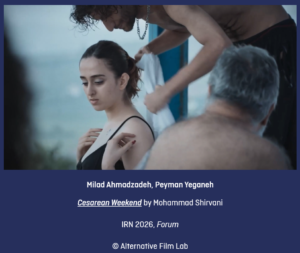
The films participating in this year's Berlinale have already been announced, so it's time to talk about Ukraine's participation.

So, in the main competition program of Berlinale 2025, among 19 contenders, the documentary "Timeline" by Kateryna Gornostai, co-produced by Ukraine, Luxembourg, the Netherlands, and France, will compete. The director gained recognition for her creative exploration of school-related themes (her film "Stop-Zemlia", about the lives of Kyiv teenagers, participated in Berlinale 2021 and won the Crystal Bear from the youth jury of the Generation 14plus program). Now she continues to explore this theme using documentary material—set against the backdrop of war."Despite the war, schools in Ukraine continue to operate. Faced with constant threats, students and teachers strive to keep learning. The mosaic-like film showcases their everyday lives across different regions of Ukraine," says the film's synopsis.Meanwhile, Berlinale's co-director of film programs, Michael Stütz, commented on what makes the film particularly compelling during a press conference dedicated to the competition program:"In the masterfully edited "Timeline", the director avoids traditional narrative strategies and instead creates a strong rhythm with a mosaic structure. Gornostai presents the remarkable resilience and hope of both young people and Ukrainian society as a whole."
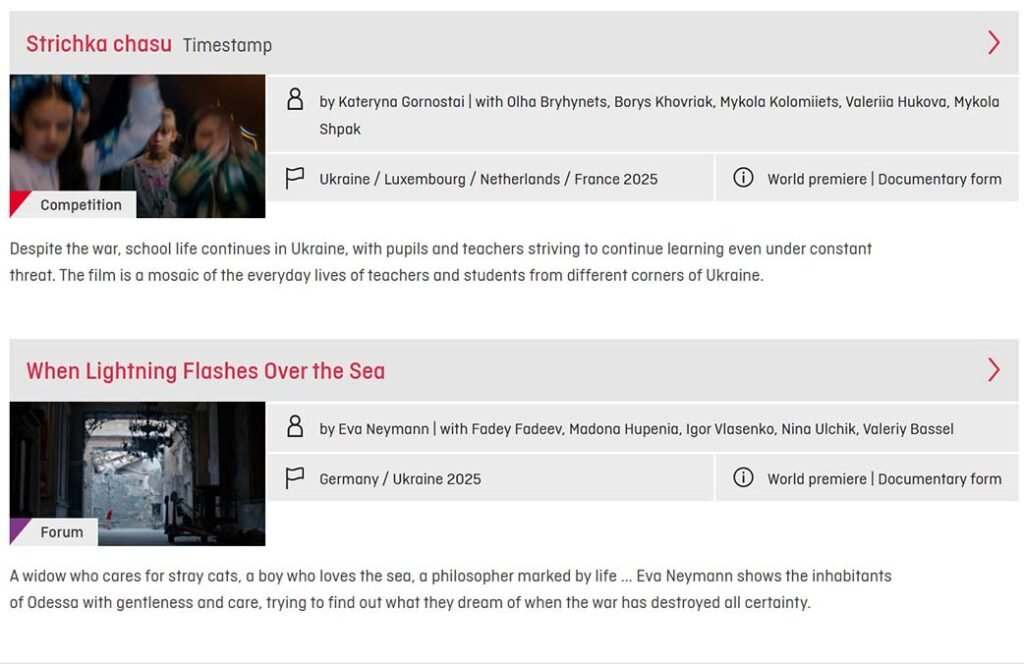
The film showcases cities from various regions—such as the symbolic Borodianka and Bucha in the Kyiv region, Cherkasy, Kharkiv... Everywhere, education in wartime conditions becomes a constant challenge and a test of resilience."‘Timeline" is like a tourniquet: it's crucial to record the time it was applied to avoid losing blood-deprived tissue," explains Kateryna Gornostai. "Nowadays, unfortunately, every student knows what a tourniquet is and why it's used, as it's now part of the school curriculum. However, this is not the main theme of the film. We focused on everyday school experiences—like tears at the first bell ceremony, a senior student playing St. Nicholas, colorful ribbons in the hands of graduates. Of course, all of this now carries the context of war: students often study in shelters due to air raid alarms, the principal shows the destroyed and sealed-off part of the school while lessons continue in the other wing, and the bell at an online graduation ceremony comes from evacuated Bakhmut.The war has deeply permeated this everyday life, but we have no choice but to keep living and learning."
In the main program of the Forum section (30 films), the documentary "Time to the Target" by Vitaly Mansky, co-produced with Latvia and the Czech Republic, is presented. Once again, the theme is war, once again—the motif of time...However, "Timeline" is about the time of life, about the future generation, and the resilience of everyday life in the face of war. Meanwhile, "Time to the Target" explores the idea that the reverse side of the time of life is the time of death.

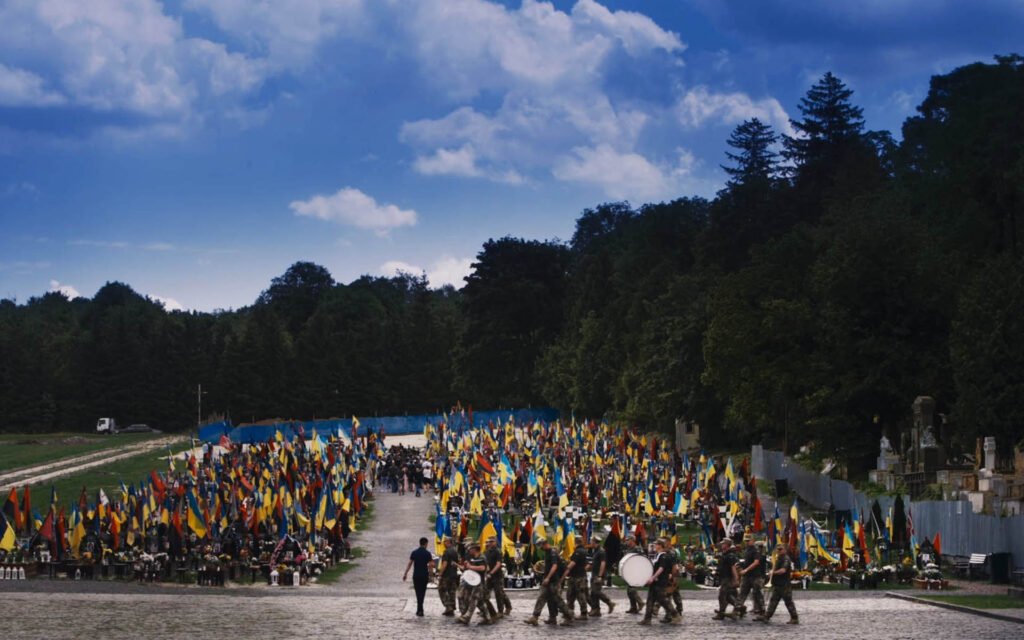
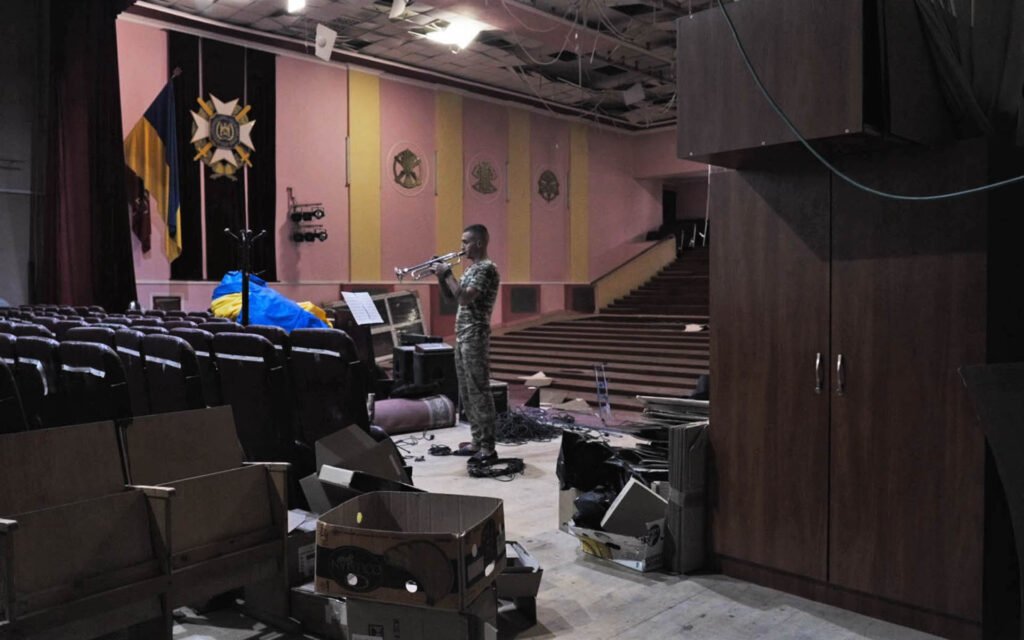
Vitaly Mansky is a native of Lviv who worked in Russia for a long time but firmly expressed his pro-Ukrainian stance with the onset of the war. After the annexation of Crimea, he moved to Latvia. In 2023, his film "Eastern Front," co-directed with Yevhen Tytarenko, competed in the Berlinale's Encounters program."Time to the Target" now focuses on Western Ukraine—specifically the rear areas, which, however, cannot feel safe either. The director speaks about the film:"This is a very important film for me. It is about my homeland at a tragic moment in its history. It provides an uncompromising look at a year and a half of life in my native city of Lviv, where the time it takes for an enemy missile to reach it is 5 minutes and 45 seconds."
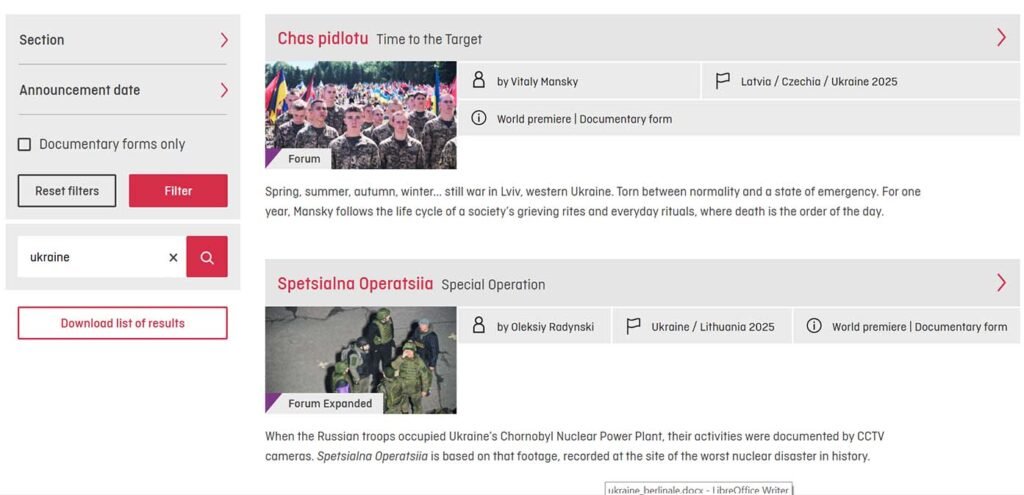
And in the same program, there is *"When Lightning Flashes Over the Sea"* by Eva Neymann, a Ukrainian-German documentary about the everyday reality of war in Odesa.What is Odesa? First and foremost, of course, it’s its unique and colorful people. They are present in Neymann’s film as well: a widow who feeds stray cats, a young man in love with the sea, a local philosopher...Her previous documentary, *"Pryvoz"*, was dedicated to Odesa's iconic market, and many see her new work as a continuation and development of the theme of Odesa’s daily life and its distinctive characters. Whether this is the case—we shall see.
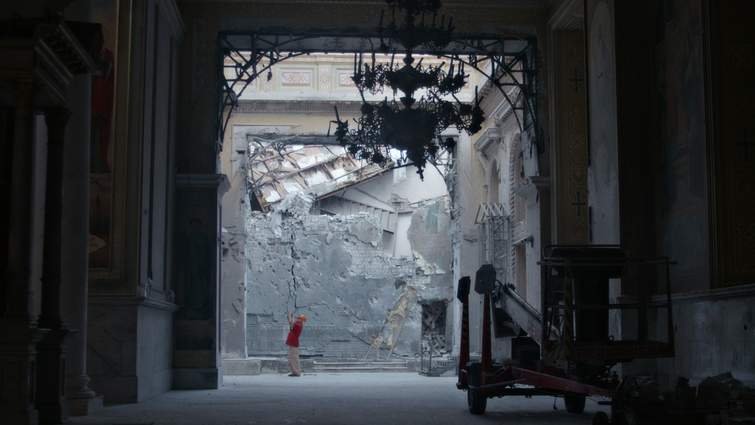
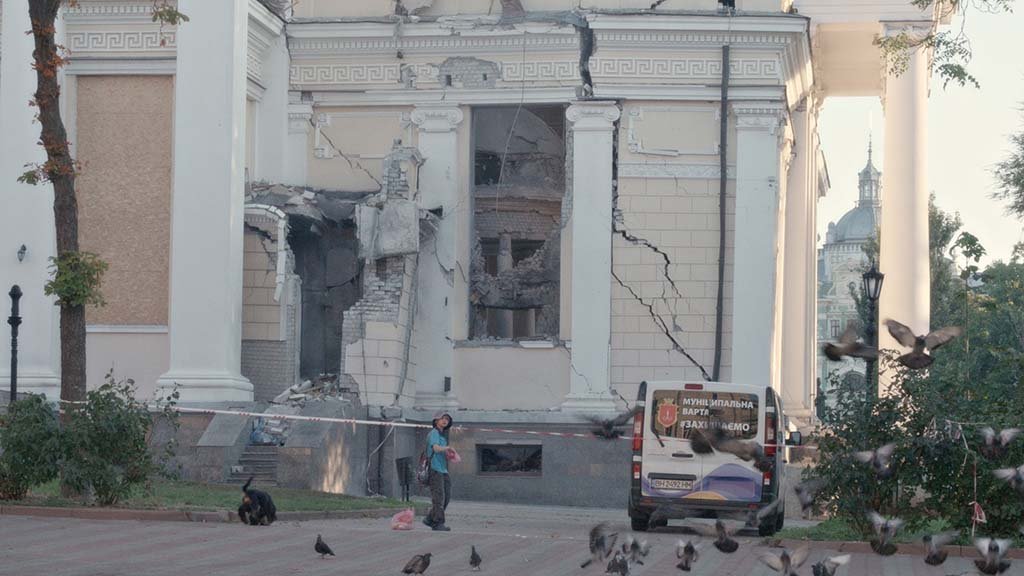
In the Forum Expanded program (24 projects, 17 films), a third region, a third world is presented. The documentary *"Special Operation"* by Oleksiy Radynski, co-produced with Lithuania, focuses on the Chornobyl Nuclear Power Plant—specifically, the events surrounding its occupation by Russian forces at the beginning of the full-scale invasion.The primary material for the film consists of surveillance footage recorded during the occupation, which the plant’s employees preserved at great personal risk.On social media, the director—known for his socially engaged and thought-provoking films—commented on the film and its presence at the festival:"This is a film-evidence: every frame of this film serves as testimony to Russia's war crime in Ukraine—the occupation of Chornobyl NPP—captured in real time by surveillance cameras. This film is an investigation and a means of discrediting the Russian army, because nothing discredits it more effectively than simple documentary footage of Russian soldiers."
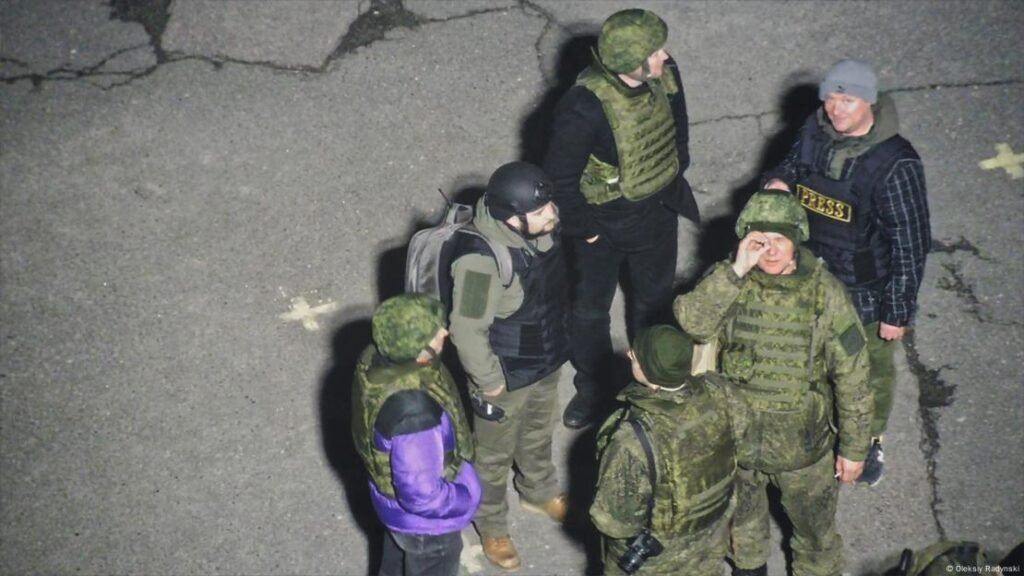
*"Special Operation"* is also an experimental film: it places its audience in the position of direct witnesses to the occupation as it unfolds through surveillance camera footage."That's why it is important to me that the film's premiere at Berlinale will take place specifically in the Forum Expanded section, which is open to experimental and political cinema," the director added.
Finally, there is a film where, unfortunately, "Ukraine" is not credited in the title—but it was created by Ukrainian Mila Zhluktenko and her co-director Daniel Asadi Faesi. The documentary *"Rückblickend Betrachtet"* ("Looking Back") is presented in Berlinale Shorts.The "hero" of the film is the "Olympia" shopping center in Munich, which was built for the 1972 Olympic Games and was the site of a shooting in 2016 that claimed the lives of ten people. Among the workers who built "Olympia" were migrants, and the shooter himself was of Iranian descent. Thus, the film explores themes of migration, historical trauma, and the intersections of the past and present.This is not the first film by the directing duo at Berlinale: their short *"Waking Up in Silence"*, about Ukrainian refugees in a displacement camp, won a special award for Best Short Film in the Generation Kplus program in 2023.
Also noteworthy is the Berlinale Co-Production Market, which features 35 film projects, including two Ukrainian films currently in production: *"The Earth Is Flat – I Flew Around and Saw It"* by Maksym Nakonechnyi and *"30 Days of Summer"* by Anastasia Solonevych. At the market, participants will have the opportunity to seek out co-production partners and find funding for further production.
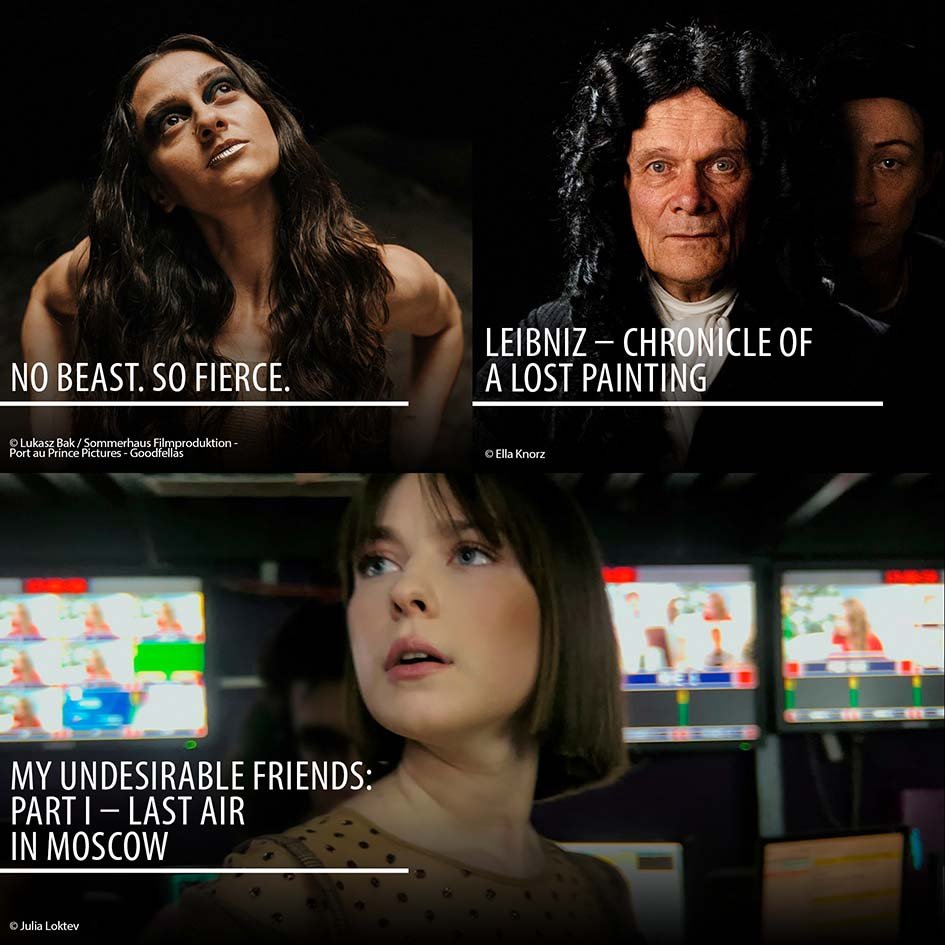

The protagonist of *"The Earth Is Flat – I Flew Around and Saw It"*, Mykola Midyak, a young man from a village, travels abroad with his friends to work. In his worldview, the Earth is flat, which gives us an idea of how his life journey will unfold.*"30 Days of Summer"* tells the story of two sisters in a military training camp.
At the end, let's add a small spoonful of tar: although this film is not directly related to our topic, Russian presence on any platform automatically becomes a Ukrainian matter. Thanks to the festival, films of Russian production are still banned, but nothing prevents Russians from appearing under different flags. Thus, in *Berlinale Special* (11 films), we will see the documentary *"My Undesirable Friends: Part I – Last Air in Moscow"* by Yulia Lokteva, produced in the USA.The film tells the story of opposition Russian journalists who are persecuted by the regime and, with the start of the full-scale invasion, leave the country. It’s too early to draw conclusions—though previous appearances of "good Russian cinema" haven't exactly inspired optimism. We shall see.
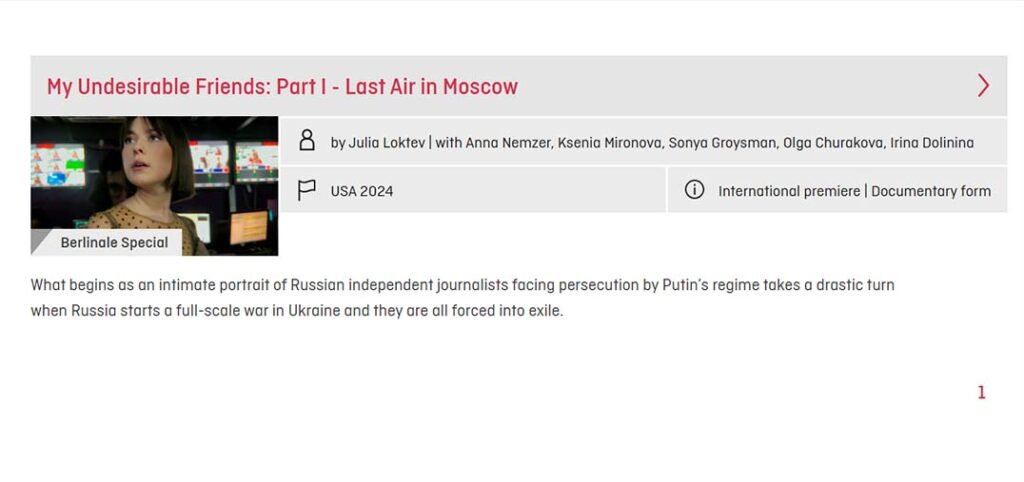
In short, let's summarize. At this moment, it's not possible to talk in detail about the films (though we are accredited at Berlinale again this year and hope to watch them), but certain trends are already visible.First: it seems that, in the near future, Ukrainian cinema will be saved by documentaries. All the films (except those still in production) are documentaries, and we can assume that this is not only for artistic reasons but also due to financial and production constraints.Second: all the projects are created in co-production. On one hand, this is good: it facilitates international connections, exchange of experiences, and promotional prospects. On the other hand, it raises a big question mark regarding the capability of the Ukrainian film production system. A striking example is Mila Zhluktenko, whose new film was made without Ukraine's involvement, so it technically won't count as part of Ukraine's cinematic achievements.And third: the theme of war. Its importance is clear and indisputable. But here lies a danger: will our festival cinema get stuck in this niche, or will it turn into an endless retelling of national tragedy, trauma, and resistance in the eyes of the world? Right now, this question isn't urgent, and we won’t argue about it. But it will inevitably arise—and our cinema must be ready for it.

